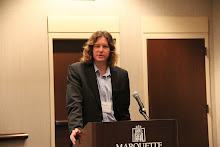Just a brief note to inform you that the collection The Art of Social Critique: Painting Mirrors of Social Life that my paper "Jean Genet: A Case Study of the Artist's Explication and Alteration of Social Practice" is published in is now available. I received my copy today and it is gorgeous. The collection of work in it seems very impressive as well.
Monday, February 27, 2012
Thursday, February 23, 2012
Graeber's "Debt"
Here is a link to a great hour-long interview with anthropologist David Graeber concerning his new book Debt: The First 5000 Years. There is also a wonderful blog seminar on the book going on over at Crooked Timber. I am working through the various blog posts as we speak and many of them are great, as are the discussions occurring in the comment sections. I highly recommend both the seminar and the interview.
Tuesday, February 14, 2012
On Zizek on Heidegger on Hegel
I recently read a new paper by Zizek on Heidegger's criticism of Hegel. The pdf can be downloaded here. Like much of Zizek's work, it is an impressive and exciting paper particularly in the way it clarifies and presents Lacan in relation to both Heidegger and Meillassoux. I suspect this paper is something of an opening volley in the battle to come with Zizek's publication of his magnum opus, Less Than Nothing: Hegel and the Shadow of Dialectical Materialism, in April of this year. Zizek has claimed that this century will come to be known as the Hegelian century and he no doubt hopes his book will be a major step in philosophy's recognition of this fact. It may be that one of the major things standing in the way of Zizek's Hegelian Return, at least on the Continental side of the issue, is the ongoing influence of Heidegger. Heidegger himself oriented his work, as he put it, on the front in opposition to Hegel and, I would claim, this opposition continued in one form or another throughout his career.
Thursday, February 9, 2012
Heidegger and the "Dialectic of the Enlightenment"
I have been rereading the Dialectic of the Enlightenment in Edmund Jephcott's fairly new translation. In the course of working through it I have been struck as never before by certain similarities between this work and Heidegger's concerns in the 1950s. This, in turn, will connect in the future to certain reflections on Vattimo and Zabala's Hermeneutic Communism. I would like to take the time to note some of these similarities and the even more striking differences, in connection with Hegel and Marx, these aspects make apparent.
Subscribe to:
Comments (Atom)


